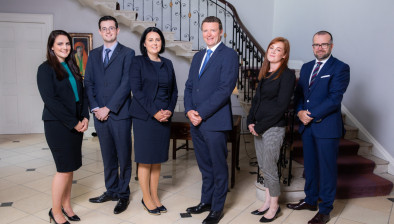Richard Gray: Private equity to fuel mergers and acquisitions activity in Northern Ireland next year

Richard Gray
Richard Gray, head of the corporate team at Belfast-based Carson McDowell, considers the trends in M&A activity in Northern Ireland.
Given the turbulence that has characterised so much of 2022, there has remained an encouraging amount of mergers & acquisitions (M&A) activity in Northern Ireland during the year — and there are signs it is set to continue into 2023.
The Market IQ survey from Experian suggests there were 150 transactions in the first nine months of this year, worth in excess of £460 million, and while that was down slightly on the same period last year, there are some notable bright spots.
Carson McDowell has played a role in a significant volume of these M&A and fundraising transactions, and it is clear that private equity funds have continued to be a key driver of deal making activity in NI, as they have elsewhere in the UK.
M&A activity this year has taken place against the backdrop of some very well documented challenges for businesses. With China only beginning to emerge from lockdown, the unwinding of supply chain issues caused by the Covid-19 pandemic has been slow.
Energy and raw material price increases driven by the war in Ukraine have created a perfect storm for business. Added to this, many sectors are also experiencing labour shortage issues post Brexit, with employers having to source people from further afield and bear the cost of new sponsored visa schemes.
Combined with rising inflation and increased interest rates, this has created a climate of uncertainty, particularly in consumer-facing sectors. However, in other sectors there is plenty of evidence that PE funds have war chests still to spend, particularly in IT and managed services.
Significant transactions last year involving the likes of Aqua Q and Neueda have been followed by significant investments by MML Capital in Vyta Secure and Bowmark Capital in Xperience.
There have also been notable investments in leading-edge technology companies, such as the Clean Growth Fund investment in clean tech company MOF Technologies and the investment by Israeli-owned Stratasys in 3D medical imaging company Axial3D.
Activity in the secondary market for pre-construction renewable energy projects remained positive, with renewable energy systems projects such as Murley and Corlacky Wind changing hands, and further activity is expected in 2023. However the absence of a functioning local Executive with a clear route to market strategy, combined with lack of grid capacity and planning delays, continues to constrain investment appetite for new projects in the sector.
Healthcare has also seen movement as investors see opportunity in the limitless demand created by an ageing population. Carson McDowell acted in the purchase by Connected Health of domiciliary care business Homecare Independent Living and it is to be expected that will be further activity in the broader healthcare sector in 2023.
Companies with robust financials showed they still have an appetite to take advantage of opportunities and heading into the new year there remain buyers looking for opportunities, with significant interest in healthcare, in B2B businesses with robust cashflow and in the tech sector, particularly for businesses who operate in the compliance and regulatory space.
Activity is quite buoyant in regtech, fintech, data and cyber security, for any companies with a unique opportunity, product or service that helps businesses tick a box they have to tick.
Sadly, faced with the rising cost of business, some trading businesses are coming under increased cash flow pressure and we are hearing anecdotally that the number of bank reviews is increasing.
Looking ahead, B2C businesses, particularly in sectors like food, hospitality and retail, are more likely to feel the pain from the squeeze on household finances, so it seems inevitable that the economic climate will lead to an increase in the number of distressed businesses.
That will create opportunity for those who still have cash on their balance sheets, particularly in more challenged sectors.
For those selling businesses, it is worth noting that the economic climate looks to be impacting pricing, as well as deal structures and timing. Asset prices and multiples are falling in comparison with the previous period and there is more emphasis on earn-outs to reach target price — sellers are not getting all of their money on day one.
Any deal that requires debt funding in addition to equity have become more challenging as banks look even more closely at potential prospects.
It is always difficult to predict too far into the future, but I am cautiously optimistic about the prospects for M&A activity in 2023. As a firm we are starting the year with a good pipeline of projects and potential transactions, and we have strengthened our team during the year in anticipation of being busy, with the recruitment of corporate partner Hilary Griffith amongst other appointments and promotions.
Northern Ireland businesses remain attractive to external buyers and many local companies are primed to make acquisitions if opportunities arise. Whether the economic situation will cause some of those buyers to pause their plans remains to be seen.

- Richard Gray is a partner and head of the corporate team at Carson McDowell.








